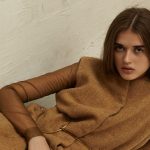“Put a wrench in it!” So said my seatmate as the third look walked down the runway at Dion Lee’s spring 2024 show.
The white button-down-and-bodysuit hybrid had wrenches on top of the boning that shaped its corseted torso. That same model wore thigh-high boots with integrated tool belts. The look prior was a tailored jacket with its seams slashed to hold another belt in lieu of pockets, and the show’s opener consisted of a tailored jacket worn over a white shirt with metal bars placed over two of its seams. You surely know the drill by now: Officewear, tools…we could call it workwear had the name not already been claimed.
Lee stretched this theme to a surprisingly vast range of hardware-clad interpretations. “This season was primarily about evolving the utility and construction language I’ve been playing with until now,” he said at a preview, mentioning the scaffolding and industrial design in his Melbourne and Miami stores and the utilitarian detailing he’s explored of late. What’s compelling about Lee as a designer is his ability to both fixate—and cleverly expand on—a specific theme while managing to keep his clothes distinctly his.
Lee said he started playing with power cords as a way to drape for his fall campaign, which carried over into this collection in the shape of shirring details by way of bungee cords. Particularly fun was a pair of trousers that had its back label replaced with an outlet; the model walked down the runway plugged in, carrying his coiled orange cord as a shoulder bag. The designer also used screwheads in lieu of studs across, turned suede work boots into tiny corsets, applied lacing detail to bottoms, and draped beautifully airy dresses, some with pin-tuck details around jewelry in the shape of screws. A piece he particularly nailed was the closing look, a crepe frock draped and ruched around an anatomically shaped structure at the abdomen. What the dress looks and feels like while sitting down is the real question, but it’s not the kind of dress you wear to sit down in anyway.
Elsewhere, Lee laminated denim and introduced foiled leather for a sleek hint of texture. The latter was used in bubble-hem skirts and dresses, which added a welcome variation of shape—these felt new for Lee, and it would be interesting to see him continue to explore working away from the body moving forward. (Speaking of the body, there were a few appreciated expansions in sizing in Lee’s casting.) Also cool were his lace lingerie-like explorations; they felt freshest where they fell weightless around the body rather than constrict it.
Another development: Lee stepped away from his usual monochromatic palette and strict category groupings to “mix things in a bit more.” The goal, he said, was to offer an “exaggerated brand wardrobe.” That is the operative word here, wardrobe—the truth is that it’s become reductive to label Lee’s clothes as nothing other than rave-ready. That they are, and they will continue to be, but he also gave his customers options past a night out. Dion Lee has a few more tools in his toolbox.



